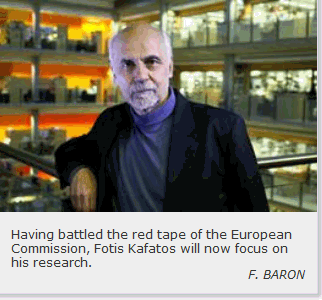
|
|
|
|
|
|
|
News & Views item - March 2010 |
![]() Helga Nowotny Assumes Presidency of European Research Council; Fotis Kafatos
Returns to Research. (March 2, 2010)
Helga Nowotny Assumes Presidency of European Research Council; Fotis Kafatos
Returns to Research. (March 2, 2010)
It's been four years that Fortis Kafatos has headed the European Research Council as its foundation president and although his term had still a year to run he asked to be allowed to relinquish the very demanding role on March 1 so that he could return to fulltime research at Imperial College London.
As NatureNews' Natasha Gilbert writes: "...delivering the first pan-European initiative to fund cutting-edge basic research judged solely on excellence" has been an exceedingly demanding job.
Professor Kafatos told Ms Gilbert: "I don't begrudge the time I spent on the ERC, but I would be foolish not to step down now — it was consuming me. If I knew how much time it would take out of my life when I started I might not have done it. But I am happy I did." He sums up his and that of the other 21 members of the ERC's scientific council: "We delivered to Europe what we promised."
So far the ERC has secured a 7-year €7.5-billion (A$11.3-billion) budget, which has funded more than 1,000 projects worth a total of €1.7 billion, but on the down side from Professor Kafatos' view was the bureaucracy of the European Commission, which is responsible for ensuring that funding from the European Union pot — including the ERC's budget — is spent properly. "We continuously had to spend energy, time and effort on busting bureaucracy roadblocks that kept appearing in our way," he told Ms Gilbert. "At best, this costs us precious energy and resources. At worst it may hamper our zeal to inspire and continuously improve the ERC strategy, it can damage the morale of our staff and discourage the top talented researchers from applying to or reviewing for the ERC."
And expressing views echoing concerns of Elizabeth Blackburn regarding "milestones"
For example, the commission insists that winners of ERC funding, who already have to provide detailed research proposals, describe the milestones they aim to reach and how, so that their projects can be audited. How successful researchers are in reaching those goals could affect their chances of winning funding in the future. Kafatos says that this rule hampers the freedom of researchers to change their plans in the light of new science after their proposal has been accepted. "This is nonsensical. If you could a priori describe what your success will be, you would not have to do the experiments," says Kafatos. "I am convinced that proper and secure use of public funds can be achieved in a much less domineering system," he adds.
And as others have pleaded reforms must be undertaken in the running of the ERC. Professor Kafatos told Ms Gilbert that a pressing challenge for his successor is to ensure that the commission follows up on the recommendations of the review led by the former president of Latvia, Vaira Vīķe-Freiberga, and published in July last year and agrees to a further review in 2011 to consider whether more reforms are needed. He also calls for new legislation to establish the ERC as a permanent institution.
Finally, the ERC should be given the freedom to choose how it operates and how it is governed. "We need to build our institution to fit the needs of the mission and not vice versa," he says.
Now it will be Helga Nowotny, a social scientist at the Vienna Science and Technology Fund, and one of the ERC's two vice-presidents to move the mountain of the European Commission toward the goals voiced by the ERC's proponents.